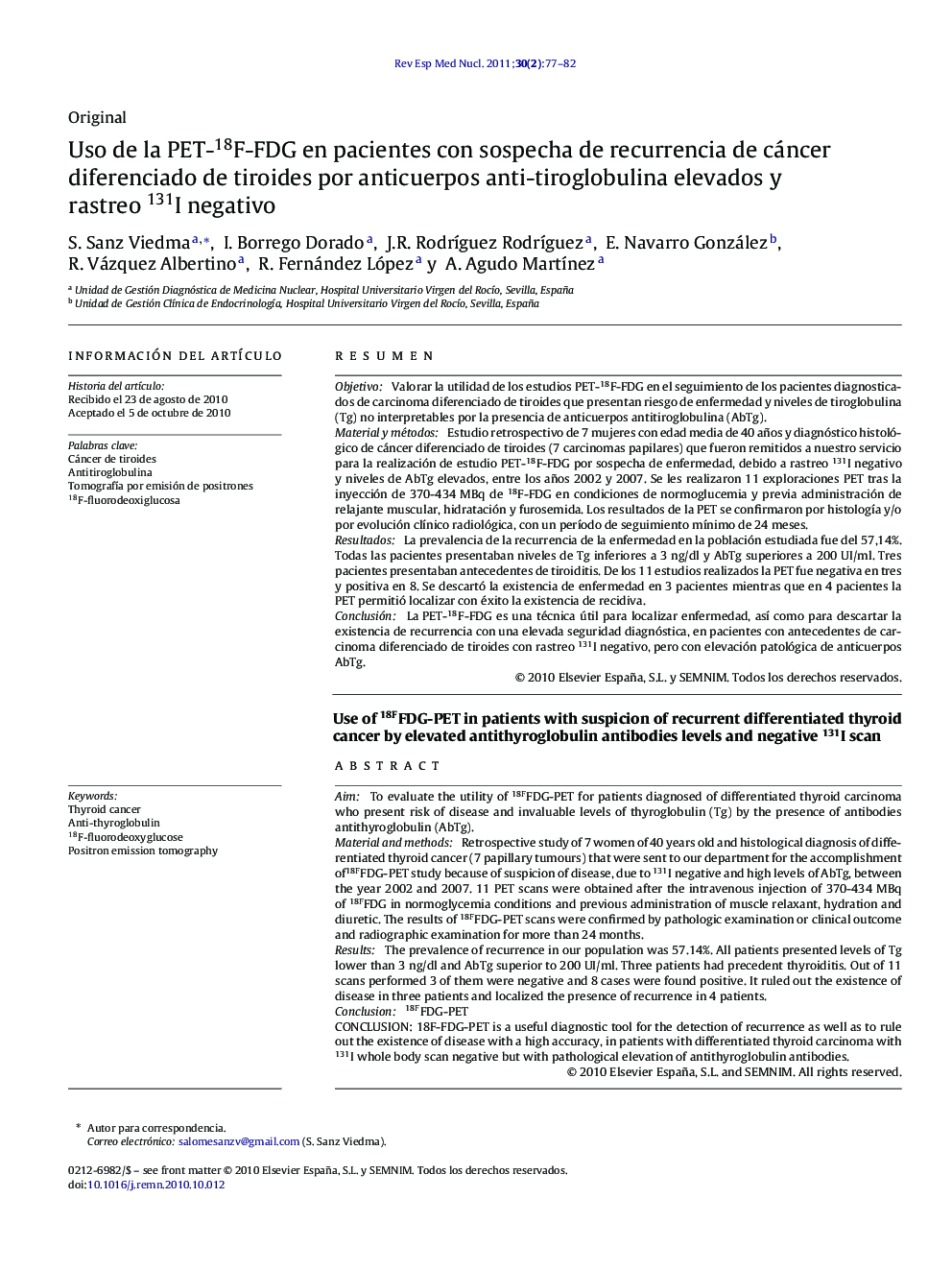| Article ID | Journal | Published Year | Pages | File Type |
|---|---|---|---|---|
| 4248886 | Revista Española de Medicina Nuclear | 2011 | 6 Pages |
ResumenObjetivoValorar la utilidad de los estudios PET-18F-FDG en el seguimiento de los pacientes diagnosticados de carcinoma diferenciado de tiroides que presentan riesgo de enfermedad y niveles de tiroglobulina (Tg) no interpretables por la presencia de anticuerpos antitiroglobulina (AbTg).Material y métodosEstudio retrospectivo de 7 mujeres con edad media de 40 años y diagnóstico histológico de cáncer diferenciado de tiroides (7 carcinomas papilares) que fueron remitidos a nuestro servicio para la realización de estudio PET-18F-FDG por sospecha de enfermedad, debido a rastreo 131I negativo y niveles de AbTg elevados, entre los años 2002 y 2007. Se les realizaron 11 exploraciones PET tras la inyección de 370-434 MBq de 18F-FDG en condiciones de normoglucemia y previa administración de relajante muscular, hidratación y furosemida. Los resultados de la PET se confirmaron por histología y/o por evolución clínico radiológica, con un período de seguimiento mínimo de 24 meses.ResultadosLa prevalencia de la recurrencia de la enfermedad en la población estudiada fue del 57,14%. Todas las pacientes presentaban niveles de Tg inferiores a 3 ng/dl y AbTg superiores a 200 UI/ml. Tres pacientes presentaban antecedentes de tiroiditis. De los 11 estudios realizados la PET fue negativa en tres y positiva en 8. Se descartó la existencia de enfermedad en 3 pacientes mientras que en 4 pacientes la PET permitió localizar con éxito la existencia de recidiva.ConclusiónLa PET-18F-FDG es una técnica útil para localizar enfermedad, así como para descartar la existencia de recurrencia con una elevada seguridad diagnóstica, en pacientes con antecedentes de carcinoma diferenciado de tiroides con rastreo 131I negativo, pero con elevación patológica de anticuerpos AbTg.
AimTo evaluate the utility of 18FFDG-PET for patients diagnosed of differentiated thyroid carcinoma who present risk of disease and invaluable levels of thyroglobulin (Tg) by the presence of antibodies antithyroglobulin (AbTg).Material and methodsRetrospective study of 7 women of 40 years old and histological diagnosis of differentiated thyroid cancer (7 papillary tumours) that were sent to our department for the accomplishment of18FFDG-PET study because of suspicion of disease, due to 131I negative and high levels of AbTg, between the year 2002 and 2007. 11 PET scans were obtained after the intravenous injection of 370-434 MBq of 18FFDG in normoglycemia conditions and previous administration of muscle relaxant, hydration and diuretic. The results of 18FFDG-PET scans were confirmed by pathologic examination or clinical outcome and radiographic examination for more than 24 months.ResultsThe prevalence of recurrence in our population was 57.14%. All patients presented levels of Tg lower than 3 ng/dl and AbTg superior to 200 UI/ml. Three patients had precedent thyroiditis. Out of 11 scans performed 3 of them were negative and 8 cases were found positive. It ruled out the existence of disease in three patients and localized the presence of recurrence in 4 patients.Conclusion18FFDG-PETCONCLUSION: 18F-FDG-PET is a useful diagnostic tool for the detection of recurrence as well as to rule out the existence of disease with a high accuracy, in patients with differentiated thyroid carcinoma with 131I whole body scan negative but with pathological elevation of antithyroglobulin antibodies.
